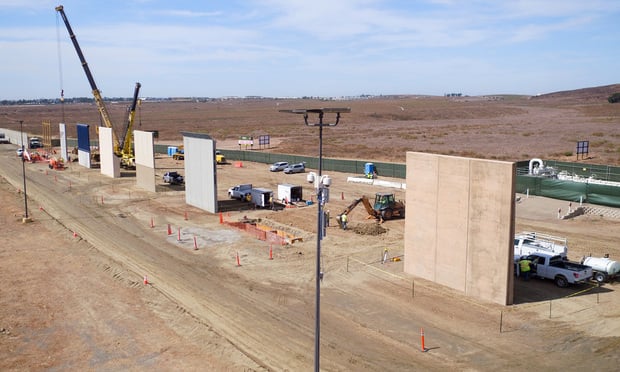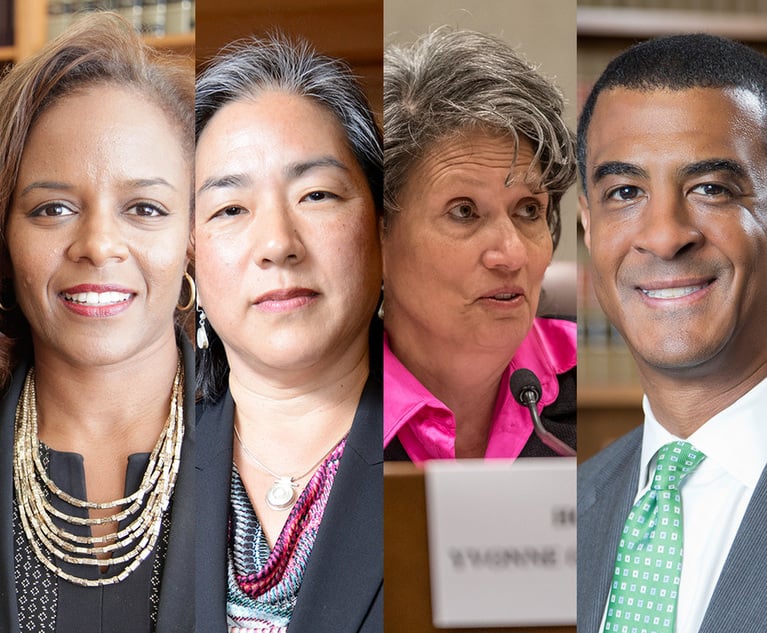At 9th Circuit, Clash of Visions on Border Wall Funding
"You can't build a wall without Congress, that's absolutely clear," said Douglas Letter, the top lawyer for the U.S. House of Representatives, arguing Tuesday as an amicus backing the plaintiffs.
November 12, 2019 at 04:28 PM
5 minute read
 Mexico-U.S. border wall prototypes/photo by CBP Photography/Flickr
Mexico-U.S. border wall prototypes/photo by CBP Photography/Flickr
Two starkly different legal views on President Donald Trump's moves to find funding for construction of barriers at the U.S.-Mexico border, a signature promise of his presidential campaign, were laid bare Tuesday morning at the U.S. Court of Appeals for the Ninth Circuit.
To the plaintiffs, a group of states and border nonprofits who sued separately to block funding, the administration violated the Constitution's Appropriations Clause when it reprogrammed military funds for border construction after being denied in the budget passed by Congress following a 35-day government shutdown.
"You can't build a wall without Congress, that's absolutely clear," said Douglas Letter, the top lawyer for the U.S. House of Representatives, arguing Tuesday as an amicus backing the plaintiffs.
Thomas Byron III, a lawyer with the Department of Justice's Civil Division arguing on behalf of the administration, meanwhile, argued that Congress had authorized the transfer of funds between Department of Defense accounts in a military spending bill passed earlier.
Byron said "it boggles the mind" that Congress could "somehow impliedly act" in a way that violated the express terms of a statute it previously passed.
The appeal springs out of cases brought by a group of Democratic states' attorneys general and nonprofit groups represented by the American Civil Liberties Union that were pending before U.S. District Judge Haywood Gilliam Jr. in Oakland. Gilliam issued orders in June and July blocking $2.5 billion in funding for the border barrier in certain locations in Arizona, California and New Mexico, finding that Congress hadn't authorized the administration to redirect funds to the appropriations account the Defense Department uses to fund its counternarcotic efforts.
A Ninth Circuit motions panel in July allowed Gilliam's injunctions to stay in place, but the U.S. Supreme Court later that month temporarily set the injunction aside until the Ninth Circuit could hear the merits of the case. The high court, voting along ideological lines, found that the administration made a sufficient showing that the plaintiffs did not have a cause of action to seek review of the decision to use Defense Department funds at the border.
At Tuesday's hearing, at least one member of the Ninth Circuit panel, Judge Daniel Collins, questioned whether the prior published motions panel was binding. Collins also questioned Byron about whether the prior panel had been correct in saying that the funds in question had been transferred from the Department of Defense to the Department of Homeland Security to proceed with border construction. Byron said that the earlier panel was incorrect and that the funds had merely shifted from one Defense Department account to another. Byron further argued that the sorts of "recreational, environmental, and aesthetic" harms alleged by the nonprofit plaintiffs weren't sufficient to establish standing to challenge a funding move expressly authorized in an appropriations statute.
Dror Ladin of the ACLU, arguing on behalf of the Sierra Club and a coalition of nonprofit groups along the border, said that his clients weren't attempting to invoke any sort of private right of action under the appropriation bill at issue, but were raising "core separation of powers issues that implicate private citizens." Ladin urged the court to decide the case "as expeditiously as it can" given the amount of construction that's already ongoing at the border.
James Zahradka of the California Department of Justice, arguing on behalf of the state plaintiffs, said that the administration had failed at argument and in its briefs to address the state's claims that their sovereign interests to enforce public health, environment, natural resources, and wildlife were at stake. "They really want to make this about this really technical government transfer," Zahradka said. "Congress has said that our state and local standards apply to federal construction projects."
Gilliam is one of three federal judges to consider a legal challenge to the administration's border wall funding maneuvers. In June, U.S. District Judge Trevor McFadden of the District of Columbia found that Congress did not have standing to sue the administration over border wall funding. In October, U.S. District Judge David Briones of the Western District of Texas found that the president violated federal law by declaring a national emergency in order to use more funds than Congress had appropriated.
Read more:
Sidley Austin Presses US House's Legal Arguments in Trump's Border Wall Fight
Justices Will Let Trump Build Border Wall Without Congressional Funding
Judge: House Lacks Standing to Sue Trump Administration Over Border Wall Funding
This content has been archived. It is available through our partners, LexisNexis® and Bloomberg Law.
To view this content, please continue to their sites.
Not a Lexis Subscriber?
Subscribe Now
Not a Bloomberg Law Subscriber?
Subscribe Now
NOT FOR REPRINT
© 2025 ALM Global, LLC, All Rights Reserved. Request academic re-use from www.copyright.com. All other uses, submit a request to [email protected]. For more information visit Asset & Logo Licensing.
You Might Like
View All
Judge Grills DOJ on Trump’s Birthright Citizenship Executive Order

Perkins Coie Backs Challenge to Trump's Ban on Transgender Military Service
4 minute read
Dissenter Blasts 4th Circuit Majority Decision Upholding Meta's Section 230 Defense
5 minute read
‘Listen, Listen, Listen’: Practice Tips From Judges in the Oakland Federal Courthouse
Law Firms Mentioned
Trending Stories
- 1States Accuse Trump of Thwarting Court's Funding Restoration Order
- 2Microsoft Becomes Latest Tech Company to Face Claims of Stealing Marketing Commissions From Influencers
- 3Coral Gables Attorney Busted for Stalking Lawyer
- 4Trump's DOJ Delays Releasing Jan. 6 FBI Agents List Under Consent Order
- 5Securities Report Says That 2024 Settlements Passed a Total of $5.2B
Who Got The Work
J. Brugh Lower of Gibbons has entered an appearance for industrial equipment supplier Devco Corporation in a pending trademark infringement lawsuit. The suit, accusing the defendant of selling knock-off Graco products, was filed Dec. 18 in New Jersey District Court by Rivkin Radler on behalf of Graco Inc. and Graco Minnesota. The case, assigned to U.S. District Judge Zahid N. Quraishi, is 3:24-cv-11294, Graco Inc. et al v. Devco Corporation.
Who Got The Work
Rebecca Maller-Stein and Kent A. Yalowitz of Arnold & Porter Kaye Scholer have entered their appearances for Hanaco Venture Capital and its executives, Lior Prosor and David Frankel, in a pending securities lawsuit. The action, filed on Dec. 24 in New York Southern District Court by Zell, Aron & Co. on behalf of Goldeneye Advisors, accuses the defendants of negligently and fraudulently managing the plaintiff's $1 million investment. The case, assigned to U.S. District Judge Vernon S. Broderick, is 1:24-cv-09918, Goldeneye Advisors, LLC v. Hanaco Venture Capital, Ltd. et al.
Who Got The Work
Attorneys from A&O Shearman has stepped in as defense counsel for Toronto-Dominion Bank and other defendants in a pending securities class action. The suit, filed Dec. 11 in New York Southern District Court by Bleichmar Fonti & Auld, accuses the defendants of concealing the bank's 'pervasive' deficiencies in regards to its compliance with the Bank Secrecy Act and the quality of its anti-money laundering controls. The case, assigned to U.S. District Judge Arun Subramanian, is 1:24-cv-09445, Gonzalez v. The Toronto-Dominion Bank et al.
Who Got The Work
Crown Castle International, a Pennsylvania company providing shared communications infrastructure, has turned to Luke D. Wolf of Gordon Rees Scully Mansukhani to fend off a pending breach-of-contract lawsuit. The court action, filed Nov. 25 in Michigan Eastern District Court by Hooper Hathaway PC on behalf of The Town Residences LLC, accuses Crown Castle of failing to transfer approximately $30,000 in utility payments from T-Mobile in breach of a roof-top lease and assignment agreement. The case, assigned to U.S. District Judge Susan K. Declercq, is 2:24-cv-13131, The Town Residences LLC v. T-Mobile US, Inc. et al.
Who Got The Work
Wilfred P. Coronato and Daniel M. Schwartz of McCarter & English have stepped in as defense counsel to Electrolux Home Products Inc. in a pending product liability lawsuit. The court action, filed Nov. 26 in New York Eastern District Court by Poulos Lopiccolo PC and Nagel Rice LLP on behalf of David Stern, alleges that the defendant's refrigerators’ drawers and shelving repeatedly break and fall apart within months after purchase. The case, assigned to U.S. District Judge Joan M. Azrack, is 2:24-cv-08204, Stern v. Electrolux Home Products, Inc.
Featured Firms
Law Offices of Gary Martin Hays & Associates, P.C.
(470) 294-1674
Law Offices of Mark E. Salomone
(857) 444-6468
Smith & Hassler
(713) 739-1250






